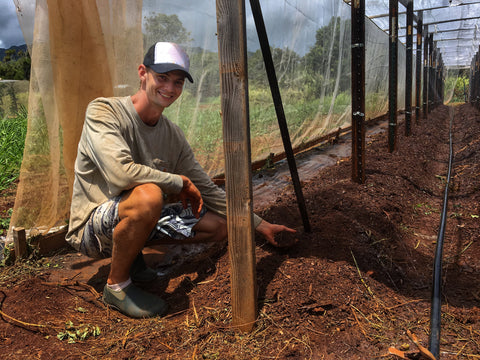Growing up on his parents’ tropical fruit farm in Kilauea, Dylan Strong refused to eat tomatoes. Luckily, his parents didn’t grow them. But the small, juicy orbs were nevertheless a staple in nearly every salad bowl.
At 18, Strong decided to flee the nest of Kauai’s north shore for San Francisco. In California’s Bay Area he developed his organic farming muscle, learning about the seasonality of food and falling in love with vegetables. Despite his upbringing, farming for a living had not previously been on Strong’s radar.
On this three-year sojourn, Strong discovered his latent ambition to become a chemical-free grower. Perhaps more surprisingly, he cultivated a palate for the one vegetable he loathed.
“I had no idea about heirloom tomatoes, or that they came in these interesting shapes and colors,” says Strong, who is 29. “I mean, some of them were almost psychedelic looking. They were the coolest vegetables I had ever seen.”
Won over by their hues of purple, yellow, green and indigo, Strong now counts the tomato as his favorite type of produce.
This coming-of-age of Strong’s taste buds would later serve as the catalyst behind Growing Strong Farm, Strong’s eight-year farming venture. The two-acre vegetable and fruit farm in Moloaa on Kauai’s northeastern shore has grown in step with Strong’s budding desire to provide the Kauai community with lip-smacking vegetable staples at a reasonable price point. Unlike the fields of sunrise papaya and sugarloaf pineapple on which he was raised, Strong grows all his produce using organic methods.
From the start, Strong’s largest crops have been tomatoes and cucumbers. In smaller quantities he grows hot peppers, bell peppers, beets, carrots, flat leaf parsley, curly kale and sugar baby watermelon. He provides Kauai Juice Co. with all these items.
Strong’s pride and joy are the tomatoes, of which he produces a weekly haul of 300 to 500 pounds. Few farmers on Kauai brave a tomato harvest, Strong says, because it’s a challenging crop to cultivate. The plant is susceptible to fruit fly maggot infestation, which is why his vines are concealed with mesh netting.
Tomato plants also require dense nutrition, which can be difficult to provide when you’re working with land that was formerly an abandoned pineapple plantation.
To that end, Strong has been able to fortify his soil by repurposing all of Kauai Juice Co.’s fruit and vegetable waste into compost. Each week Strong delivers into his soil 3,000 to 4,000 pounds of citrus rinds, pineapple peels, cilantro pulp and other scraps he picks up from the Juice Co. The compost strengthens the dirt with micronutrients, liberates nutrients already locked inside the soil and aids in Strong’s quest to achieve disease and insect infestation suppression. The partnership also helps to further Kauai Juice Co.’s mission to create a business that leaves behind minimal waste.
Strong is convinced that his composting practice is the reason why the flavor of his tomatoes is so superior to the bland ones from his childhood.
“The Juice Co.’s waste is my treasure,” Strong says. “It makes the soil so much healthier, which makes the produce actually taste better. And because it has more nutrients, it’s actually healthier for you to eat.”
Year-round, Growing Strong Farm delivers fresh produce to restaurants and small grocers across Kauai’s east and north shores, including Jean-Marie Josselin’s JO2 in Kapaa and Baracuda in Hanalei. Kauai Juice Co. is the farm’s biggest client, and thus Strong’s business has grown in pace with the Juice Co.’s soaring demand for produce that is local, organic and delicious. It’s a synergistic relationship that Strong describes as beautiful.
“The more juice they produce, the more I can produce,” Strong says. “It’s a win-win for everyone, including the consumers.”
Written by Brittney Lyte




Leave a comment